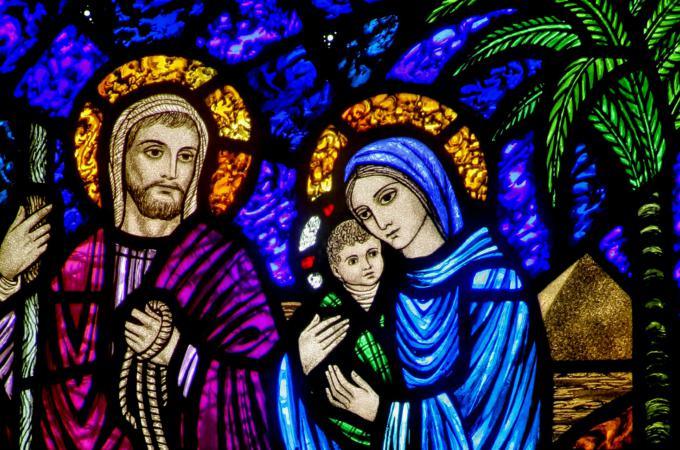Holy Family: Egypt or Nazareth?
Q. We have just read several accounts of the birth of Christ during Masses after Christmas. In reading Luke 2:39-40 and Matthew 2:13-15, it appears that there is a difference as to what happened after Jesus was born. My question is this: Did the Holy Family flee to Egypt or did they return to Nazareth? (Indianapolis)
A. My answer would be that both things happened: Following the birth of the Christ Child and the visit of the Magi, the Holy Family fled to Egypt to avoid Herod's persecution and then they eventually returned to Nazareth, which was their family's home.
Attempts to find a contradiction in Luke's and Matthew's infancy accounts are based on a false understanding of the Gospels. None of the evangelists claimed to have written an exhaustive chronological account of every event in the life of Christ; they wrote for different audiences (Jewish Christians and gentile Christians) and highlighted different things.
My own view of the sequence of events -- and this seems to harmonize the Gospel accounts of both Matthew and Luke -- is that Jesus was presented in the Temple a few weeks after his birth; then the Holy Family fled to Egypt and, after the death of Herod, returned to Palestine and settled in Nazareth.
Nowhere does Luke say that they returned to Nazareth "immediately" after the birth of Jesus. Luke 2:39 simply says of Jesus, Mary and Joseph: "When they had fulfilled all the prescriptions of the law of the Lord, they returned to Galilee, to their own town of Nazareth."
Each Gospel writer was selective about the details of Jesus' life, according to his purposes. Matthew, for example, doesn't mention the presentation or the finding of Jesus in the Temple.
Q. What does it mean when we say in the Apostles' Creed that Jesus "descended into hell"? That statement is not used in the Nicene Creed, which we often say at Mass. It bothers me so much that when I say the rosary, I substitute "limbo" for "hell." (Charlottesville, Virginia)
A. Since Advent in 2011, when the third edition of the Roman Missal was put into use in the United States, parishes have had the option at Sunday Mass of using the Nicene Creed or the (shorter) Apostles' Creed. I am not surprised that the words in the Apostles' Creed about Christ's descent into hell bother you, because the common understanding of Catholics has been that the word "hell" denotes the permanent abode of the devil and the damned, a place of eternal punishment from which there is no escape.
I'm not sure, though, that you'd want to substitute "limbo," since limbo has a different meaning, has never been a fixed article of belief in the Church and is, I would say, even more questionable today. (In years past, it was thought by most Catholics that children who died without being baptized went, not to be with God in heaven, but to a state of natural happiness called limbo. But in 2007, with the approval of Pope Benedict XVI, the Church's International Theological Commission concluded that "there are theological and liturgical reasons to hope that infants who die without baptism may be saved.")
As to the phrase "descended into hell," it may help to know that, in early Christian times, the Hebrew word for hell ("Sheol") was ambiguous; it could mean the place of the damned, but it was also used to include the place where the righteous awaited redemption.
Until Jesus had completed his death and resurrection, the just could not yet know the joy of being in God's presence. So, when the Apostles' Creed says that Jesus "descended into hell," it means that he went to rescue the just who had already died, to take them with him to heaven.
- Father Kenneth Doyle is a columnist for Catholic News Service



















